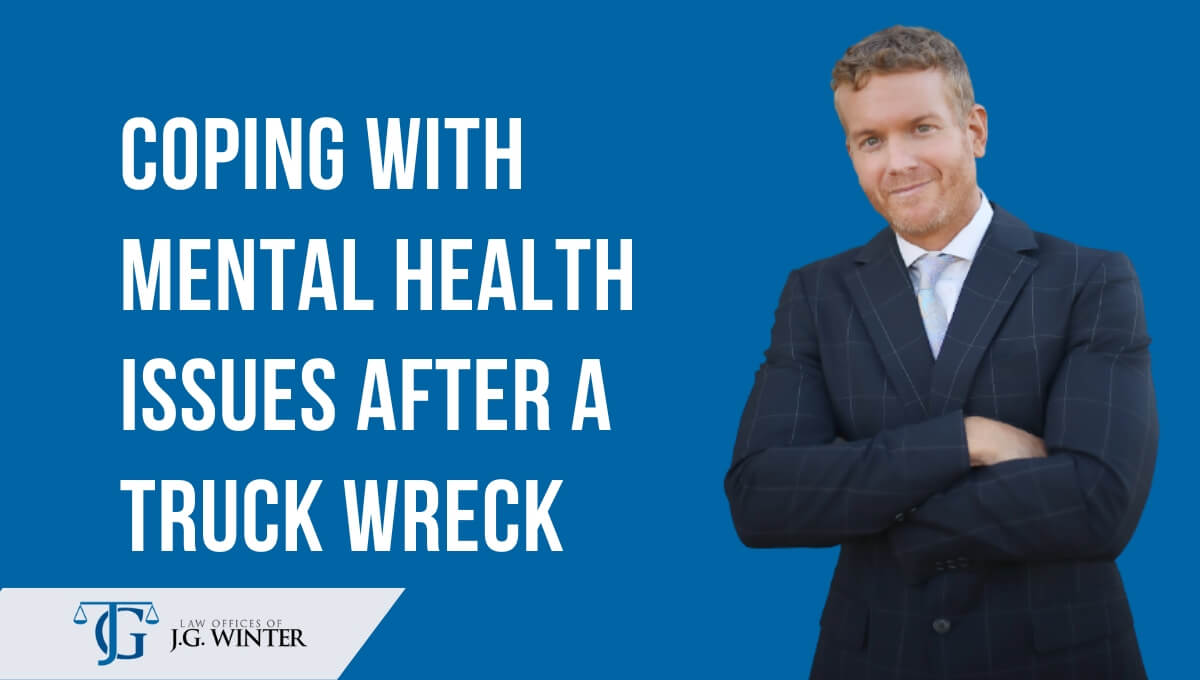It’s a common misconception that the effects of a truck accident are purely physical. However, the trauma from such incidents often leaves lasting psychological scars, presenting challenges in coping with mental health issues after a truck wreck. Victims might face everything from anxiety to full-blown PTSD from truck accident experiences, casting a shadow over their daily lives. The emotional toll can be as debilitating as any physical injury, if not more.
It’s crucial to recognize these signs early and seek the necessary support. Alongside emotional and psychological healing, pursuing a lawsuit is also pivotal. JG Winter Law specializes in guiding those affected by these traumatic experiences, helping them find their emotional footing and get the justice they deserve.
Understanding mental health
Mental health is a vital aspect of our overall well-being, encompassing our emotional, psychological, and social stability. It affects how we think, feel, and act in daily situations. Good mental health contributes to our decision-making processes, how we cope with stress, and our ability to relate to others. Conversely, poor mental health can be a result of various factors, including traumatic events like a truck accident. After such incidents, the mind can suffer silently, even when the body heals. Recognizing and addressing the signs early is crucial, especially when dealing with the aftermath of accidents and coping with mental health issues after a truck wreck.
Common psychological symptoms after being in a truck accident
Surviving a truck accident can be a life-altering experience. Beyond the physical injuries, victims often grapple with a range of psychological symptoms that can be just as debilitating. Recognizing these symptoms is the first step towards seeking the necessary support and healing.
Trouble Sleeping
Following a traumatic event, it’s common for victims to experience disturbances in their sleep patterns. They may suffer from insomnia, frequent waking during the night, or nightmares related to the incident. Sleep is crucial for physical and mental recovery; thus, disruptions can prolong the healing process.
Check our blog: truck driver sleep apnea, to know about the common symptoms and causes of sleep apnea in truck drivers.
Recurring flashbacks
Victims often relive the accident through intense and unexpected flashbacks. These vivid memories can strike at any time, making the person feel as though they’re experiencing the trauma all over again. It can be particularly distressing and can interfere with daily life.
Difficulty in concentration
Concentration and focus can become challenging after facing a traumatic event. Victims might find it hard to complete tasks, maintain a conversation, or follow a sequence of events. This lack of concentration can be a result of overwhelming stress or PTSD from truck accident symptoms.
Difficulty in driving again
The fear of getting back on the road is a common aftermath for many truck accident survivors. They might feel anxious, panic-stricken, or hesitant even at the thought of driving. This avoidance behavior is often linked to the fear of reliving the trauma or facing another potential accident.
Common injuries after a truck accident

Truck accidents are notoriously severe due to the sheer size and weight of these vehicles. As a result, the injuries sustained can be more significant and varied compared to standard car collisions. Understanding these injuries is crucial, especially when considering the long-term physical and psychological consequences they can impart on survivors.
- Traumatic Brain Injuries (TBI): These can range from mild concussions to more severe brain damage. Symptoms might include headaches, memory loss, and mood changes.
- Spinal Cord Injuries: Affecting the vertebrae, such injuries can lead to partial or complete paralysis, impacting a victim’s ability to move or feel sensations.
- Broken Bones: The force of a truck collision can break or fracture bones. These injuries often require surgical interventions and can have lengthy recovery times.
- Internal Injuries: Organs can be bruised or punctured from the impact. It can lead to internal bleeding, which might not be immediately obvious but is life-threatening.
- Lacerations and Abrasions: Deep cuts or scrapes can result from shattered glass or metal. They might leave scars or require stitches.
- Burns: In cases where a truck accident leads to fires, victims might sustain first, second, or third-degree burns, necessitating long-term care and potential skin grafts.
- Amputations: In extremely severe crashes, limbs might be crushed or require surgical amputation due to the extent of damage.
- Whiplash: A common injury in rear-end collisions, whiplash affects the neck muscles and spinal cord, causing pain and limited range of motion.
Besides these, there are more damages you may encounter in a truck accident case.
Psychological affect after a truck wreck
A truck wreck is physically traumatizing and can leave long-lasting psychological scars. Survivors often grapple with a range of emotional responses, with many experiencing symptoms akin to ptsd after truck accident. Recognizing and addressing these psychological impacts is crucial for holistic recovery and returning to a semblance of normalcy post-accident.
Post-traumatic stress disorder (PTSD)
PTSD can also manifest in individuals who’ve undergone traumatic events like severe accidents. Symptoms include reliving the accident, nightmares, and heightened arousal responses. Many report experiencing ptsd from truck accident episodes where they feel as if the crash is happening all over again.
Anxiety
Beyond the immediate trauma, survivors might feel anxious about getting back on the road or even being near large vehicles. This constant state of fear can be debilitating, making everyday activities a challenge. Terms like truck accident ptsd are a testament to how profound this anxiety can be.
Depression
The aftermath of a truck accident can be overwhelming. With physical injuries, mounting medical bills, and changes to daily life, it’s not uncommon for victims to slip into depression, feeling hopeless about their situation.
Phobias
Specific phobias can develop after traumatic incidents. A victim might develop an intense fear of driving or even being a passenger in any vehicle post-accident. This fear can be so profound that it hinders their daily commuting or traveling routines.
Excessive tiredness and fatigue
While physical injuries are healing, the mental strain can cause excessive tiredness and fatigue. This isn’t just about a lack of sleep but a profound mental exhaustion from continuously reliving the accident or battling the aforementioned psychological symptoms.
What are the preventions?
Understanding the psychological impacts of a truck accident is essential, but it’s equally vital to know how to mitigate these effects. Taking proactive steps can aid in faster emotional recovery and ensure a better quality of life post-accident.
Self-care
Prioritizing self-care is pivotal. Simple activities, like engaging in relaxation techniques, getting adequate sleep, eating a balanced diet, and staying connected with loved ones, can be therapeutic. It’s crucial to listen to one’s body and mind and give oneself the time and space to heal.
Seek professional help
Psychotherapy, counseling, or even group therapy can be beneficial. Mental health professionals can offer coping strategies, provide a safe space to process emotions, and guide victims in navigating their ptsd from truck accident symptoms. Therapy can be a beacon of hope in the tumultuous journey of recovery.
How can a truck accident lawyer help you get compensation for your damages?

Navigating the aftermath of a truck accident can be overwhelming, especially when dealing with the compounded stress of coping with mental health issues after a truck wreck. Legal complexities can add to this burden, making it hard for victims to get the compensation they rightly deserve. A skilled truck accident lawyer can help you handle the intricate legal processes, from gathering evidence and liaising with insurance companies to representing you in court.
J.G. Winter Law, with its proven track record, is committed to fighting for the rights of truck accident victims, helping them get justice and a fair settlement. Our truck accident attorneys fight for your compensation for both physical and psychological damages while you focus on healing. Contact us today for a free consultation.
FAQs: Coping with mental health issues after a truck wreck
Can you have PTSD and be a truck driver?
A truck driver can develop PTSD from a truck accident. Just like anyone else, they are susceptible to traumatic experiences that can lead to post-traumatic stress disorder. However, PTSD can impact their ability to safely operate a vehicle, especially if they experience triggers or flashbacks while driving. It’s essential for drivers to seek treatment and ensure they are mentally fit before getting behind the wheel.
Can you have depression and be a truck driver?
Truck drivers can experience depression just like any other profession. The solitary nature of trucking and long hours on the road can sometimes exacerbate feelings of isolation and sadness. Drivers experiencing depression must seek help, as it can affect their concentration and decision-making abilities, potentially compromising safety. That’s why you must obey the safety first.
Also read: How safety regulations will affect your trucking accident case.
What triggers PTSD after a truck accident?
PTSD after a truck accident can be triggered by various factors. These might include the severity of the accident, personal injuries, witnessing harm to others, or previous traumatic experiences. Additionally, reminders of the accident, such as similar road conditions, vehicle sounds, or even specific locations, can act as triggers, causing distressing flashbacks or anxiety.
How do you care for yourself mentally after a truck accident?
Caring for oneself mentally after experiencing a traumatic event like a truck accident is crucial. Some recommended steps include seeking professional counseling, joining support groups, practicing relaxation techniques, ensuring a regular sleep pattern, and avoiding alcohol and drugs. Taking the time to heal and acknowledging the need for help can make a significant difference in recovery.
How much money can you get for PTSD from a truck accident?
Compensation for PTSD from a truck accident varies based on the severity of symptoms, the impact on one’s quality of life, and specific jurisdictional laws. We, J.G. Winter Law, can provide a more precise estimate based on individual circumstances and help victims get the compensation they deserve.
How long does mental issues last?
The duration of mental health issues varies from individual to individual. Some people might recover within a few months, while others might experience symptoms for years or even a lifetime. Factors like the severity of the trauma, personal resilience, the quality of early intervention, and the presence of a support system play roles in the recovery timeline.


